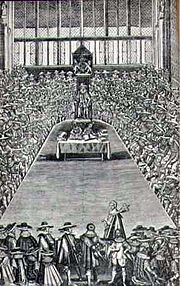Closure of the London theaters (1642)
The closure of the London theaters was an order of the English Long Parliament dated September 2, 1642.
The Puritans , who formed the majority in parliament, wanted a moral renewal of the church and thus of society as well. They placed great emphasis on personal conversion, personal religious experience, and turning away from anything they considered secular. The English civil war that had broken out a few months earlier in January 1642 was certainly a reason for considering easy entertainment in this chaos of civil war as inappropriate. And so the arrangement cited the current "times of humiliation" and their incompatibility with "public stage plays" which display "lascivious happiness and ease". Since the ban was apparently not fully effective, it was reinforced by a tightening of the law on February 11, 1648. This envisaged the classification of actors as criminals, the destruction of theater seats and fines for spectators.
The wording of the prohibition of September 2, 1642:
“Whereas the distressed Estate of Ireland, steeped in her own Blood, and the distracted Estate of England, threatened with a Cloud of Blood by a Civil War, call for all possible Means to appease and avert the Wrath of God, appearing in these Judgments ; among which, Fasting and Prayer, having been often tried to be very effectual, having been lately and are still enjoined; and whereas Public Sports do not well agree with Public Calamities, nor Public Stage-plays with the Seasons of Humiliation, this being an Exercise of sad and pious Solemnity, and the other being Spectacles of Pleasure, too commonly expressing lascivious Mirth and Levity: It is therefore thought fit, and Ordained, by the Lords and Commons in this Parliament assembled, That, while these sad causes and set Times of Humiliation do continue, Public Stage Plays shall cease, and be forborn, instead of which are recommended to the People of this Land the profitable and seasonable considerations of Repentance, Reconciliation, and Peace with God, which probably may produce outward Peace and Prosperity, and bring again Times of Joy and Gladness to these Nations. "
On January 24, 1643, the actors asked Parliament to reopen the theaters. For this they wrote: "The actors reprimand or complain that their profession has been silenced and they have been banned from their various playhouses" and confessed: "We have freed our stages of all obscene and bizarre jokes."
In 1660, right at the beginning of the Stuart Restoration , the newly enthroned King Charles II allowed the play to be performed again. To this end, he granted the letters patent to two theater companies to perform “legitimate theater play” in London. These were the Duke's Company , led by William Davenant, and the King's Company, led by Thomas Killigrews .
See also
Individual evidence
- ↑ Jane Milling, Peter Thomson, Joseph W. Donohue, Baz Kershaw (Eds.): The Cambridge History of British Theater, Volume 1 . Cambridge University Press, Cambridge 2004, ISBN 0-521-65040-2 , pp. 439 (English, limited preview in Google Book search).
- ↑ Jane Milling, Peter Thomson, Joseph W. Donohue, Baz Kershaw (Eds.): The Cambridge History of British Theater, Volume 1 . Cambridge University Press, Cambridge 2004, ISBN 0-521-65040-2 , pp. 459 (English, limited preview in Google Book search).
- ↑ 'September 1642: Order for Stage-plays to cease.', In Acts and Ordinances of the Interregnum, 1642-1660, ed. CH Firth and RS Rait (London, 1911), pp. 26-27. online , accessed August 30, 2019.
- ^ The Actors remonstrance or complaint for the silencing for their profession, and banishment from their severall play-houses. (... "wee have purged our stages of all obscene and scurrilous jests." ...). In: Eighteenth Century Collections Online. January 24, 1643, accessed September 1, 2019 .
- ^ Brian Corman (ed.): The Broadview Anthology of Restoration and Eighteenth-Century Comedy . Broadview Press, 2013, ISBN 978-1-77048-299-9 , pp. 9 (English, limited preview in Google Book Search).
